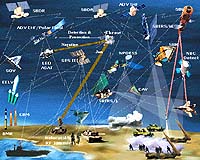 |
Tel Aviv, Israel (UPI) May 7, 2010 Despite the efforts of Israel's defense industry to develop a range of anti-missile systems, Israeli security officials are increasingly concerned the Jewish state doesn't have enough protection against Hezbollah's growing arsenal. The Syrian-manufactured M600 missiles Hezbollah reportedly received in 2009 are seen as a particular threat. These carry guidance systems, unlike most of the 45,000 rockets and missiles Israeli Defense Minister Ehud Barak says the Iranian-backed Lebanese movement possesses. The head of the Israeli air force's air defense command, Brig. Gen. Doron Gavish has said that the systems currently deployed in Israel could be overwhelmed by "the massive deployment of weapons of this type in enemy countries and terror organizations." Gavish's comments, made at Israel's first international conference on anti-missile systems near Tel Aviv, "left no room for doubt about Israel's concerns over the tens of thousands of rockets and advanced missiles being acquired by Syria, Iran and Hezbollah," the liberal Haaretz daily reported. At present, the air force operates several batteries of the Arrow-2 anti-ballistic missile interceptors that are designed to destroy long-range missiles like Iran's Shehab-3B and its successor, the Sejjil-2, which has yet to become operational. The Arrow, developed in the 1990s by Israel Aircraft Industries -- now Israel Aerospace Industries -- is considered reliable as a high-altitude, long-range interceptor. The more advanced Arrow-3, when it becomes operational, will be even more effective. But it has never been tested in action against a mass assault by Iranian ballistic missiles. The Arrow is the top-tier of a planned Israeli multi-layered, interlinked missile defense shield. Iron Dome, the bottom tier, has just become operational with one battery deployed and another preparing to do so. It is designed to knock out short-range missiles such as the 122mm Katyushas and Grads used by Hezbollah and the Palestinian Hamas in the Gaza Strip. But Israeli officials argue that the air force will need at least another dozen batteries to cope with the hundreds of missiles and rockets that Hezbollah alone could unleash on a daily basis for a prolonged period. During Hezbollah's 34-day war with Israel in July and August 2006, Hezbollah hammered northern Israel with nearly 4,000 rockets and the plan for an integrated missile defense system effectively emerged from that experience. At that time, Israel had no dedicated anti-missile defenses against such a sustained and unprecedented barrage and the air force was unable to counter it. Hezbollah was able to fire 150 to 200 projectiles a day for a month out of an arsenal of some 12,000-13,000. "If that ratio is maintained today, with a (Hezbollah) arsenal of 45,000 rockets, we can expect 15,000 rockets to be fired at Israel and possibly far more," observed Chuck Freilich, a former deputy security adviser in Israel and now a senior fellow at Harvard's Kennedy School. "This poses new and heretofore unknown threats to Israel's home front and makes it truly essential that Israel gets it right this time." The middle tier of the intended missile shield, a system known as David's Sling, sometimes called Magic Wand, is being developed by Rafael Advanced Defense Systems and U.S. defense giant Raytheon. It is designed to counter mid-range missiles but is unlikely to become operational, even in limited numbers, until 2013 at the earliest. Much has been made in recent weeks of Israel's claim that Syria has supplied Hezbollah with Soviet-era ballistic Scud missiles with a range of up to 430 miles. This has been greeted with considerable skepticism, since Hezbollah, whose military doctrine is largely based on agility, mobility and deception, has little need for a system that is so cumbersome, vulnerable and inaccurate. The road-mobile M600, the Syrian version of Iran's Fateh-110 missile, is more accurate, although it carries a smaller warhead, and can be launched within minutes because it uses solid fuel. It has a range of 190 miles. "M600s are the true threat Hezbollah poses to Israel," Haaretz's diplomatic correspondent Amos Harel wrote in Thursday's edition. "With enough M600s, Hezbollah could systematically bombard Israel's most strategic sites. Israel's missile defense systems, meanwhile, are far from adequate "Unless the Israel Defense Force starts bolstering its defensive capabilities -- and not just its offensive ones -- it risks being prepared for the most convenient scenario, rather than the one that is actually likely to happen."
Share This Article With Planet Earth
Related Links Learn about missile defense at SpaceWar.com Learn about nuclear weapons doctrine and defense at SpaceWar.com All about missiles at SpaceWar.com Learn about the Superpowers of the 21st Century at SpaceWar.com
 NATO calls for pan-European missile shield
NATO calls for pan-European missile shieldBrussels (UPI) May 6, 2010 Building a European-wide missile shield would cost no more than $250 million, NATO Secretary-General Anders Fogh Rasmussen said. At a news conference Wednesday at NATO headquarters in Brussels, Rasmussen said he was in favor to link and expand NATO's missile defense systems to protect the entire continent. "NATO is already building a missile defense system to protect our armed fo ... read more |
|
| The content herein, unless otherwise known to be public domain, are Copyright 1995-2010 - SpaceDaily. AFP and UPI Wire Stories are copyright Agence France-Presse and United Press International. ESA Portal Reports are copyright European Space Agency. All NASA sourced material is public domain. Additional copyrights may apply in whole or part to other bona fide parties. Advertising does not imply endorsement,agreement or approval of any opinions, statements or information provided by SpaceDaily on any Web page published or hosted by SpaceDaily. Privacy Statement |